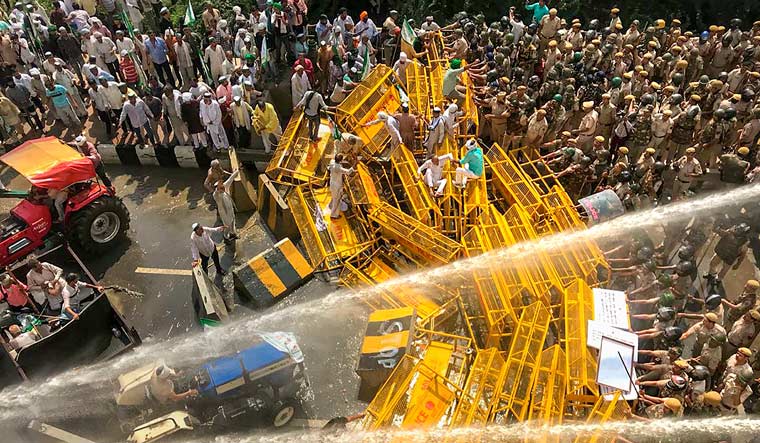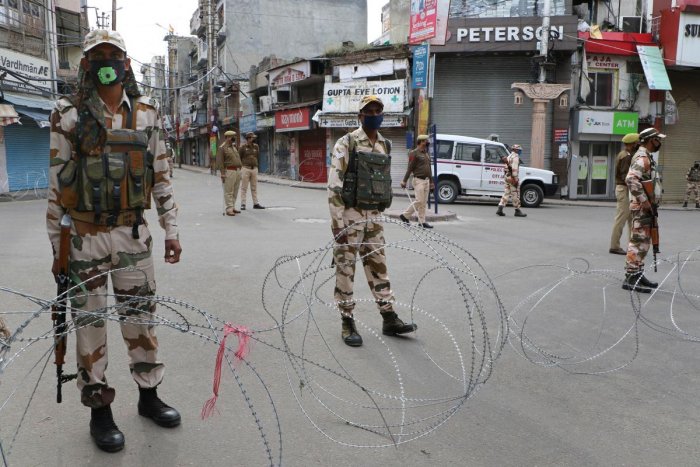Goa is abuzz with excitement as vintage bike and car owners, users, collectors and fans are decking […]

MODI SARKAR KILLS PROTEST!
Dec 05- Dec 11, 2020, INFOCUS December 4, 2020HEARTLESS: The Central government used water cannons to frightened the large number of men, women and children protesters, protesting against the injustice of the three farm bills recently passed by the Central government
By Rajan Narayan
Section 144 of the Indian Penal Code is being used and misused by both the Central and State government. It was originally passed by the British colonial regime to harass freedom fighters. It is now used by the Central government not only to break up the huge protest by farmers but even to enforce Covid-19 lockdowns. Under Section 144 the gathering of more than four people at any specified place is banned and it is a criminal offense……..
FOR almost a week farmers from Punjab, Haryana and Himachal Pradesh, have been seeking a meeting with Prime Minister Narendra Modi. They are seeking a meeting on to protest against the three amendments made to the farmers bill which will leave them worse off than at present. What is the response of the Central government to the massive protest by farmers from the Northern region who supply almost all the country’s requirement of food grain. The police put up their usual barriers. The angry and aggressive farmers threw the barriers into the Ganga. The police used water cannons to stop the farmers from entering Delhi. The farmers moved forward in their tractors and blocked all entry into Delhi.
The farmers are not staging a revolution. They are only demanding that their elected leaders discuss with them and take their opinion before passing legal acts which will change their status quo as farmers free to do business in their own interests first. It is a very free demand. But the response of the Central government is to ask the farmers to hold their protest in a remote part of Delhi where they may be neither seen nor heard presumably.
The farmers have righty rejected the offer, pointing out that being confined to a remote maidan would be akin to being in jail. In childish revenge the Modi government has now stopped trains from running through the state of Punjab and Haryana.
This is not the first time that the Modi government and even state governments have stopped protest. The Jat community in the north have demanded a similar status as other back classes. In Maharashtra the Marathas want OBC status. The reasons are common in both Jan and Maratha cases. Jat-owned lands make up Punjab, Haryana and Rajasthan and also here are the farmers of Maharashtra.
Due to the mechanisation of agriculture the jobs for farm labor have shrunk sharply. Farmers who employed labor to till their fields using buffalo or other animal-pulled ploughs are now tilling their fields with mechanical tractors. The laborious task of manually harvesting crops has also become much simpler and faster with the arrival of combine harvester. Farming used to provide thousand of jobs for rural manuel labor for men and women. Their services are no longer needed as highly educated techo savvy farmers have now managed to switch to mechanical farming.

Moreover many of Generation Next in the farming communities of the richer states do not want to follow the occupation of their grandparents and parents. The problem is also aggravated by fragmentation of farmland . The size of holdings keep getting smaller and smaller with each new generation. If a farmer has seven sons then the property gets divided into seven farms. Mechanical agriculture is not viable in small holdings. Children of farmers don’t want to do farming for a living, they want to become doctors, engineers, rocket scientists.
Unfortunately, the demand for inclusion among the OBCs is not possible. This is because the Supreme Court has ruled that only economically and socially backward communities can be classified under other backward communities. The Jats of the north are among the most prosperous and influential communities. Similarly, in Maharashtra it is the Marathas who claim to be descendants of Shivaji Maharaj and make up a most powerful community.
The Jats and the Marathas asking for OBC status is like the Brahmins asking for reservation. Ironically, in Tamil Nadu where reservations have touched 100% a Brahmin student cannot get a seat in an engineering or medical college even if he or she gets 100% marks! The reservations are a hangover from the Constitution which stipulates that reservations should be made for Scheduled Castes and Tribes. Father of the Indian Constitution Dr Babasaheb Ambedkar who was a Dalit himself insisted on reservations for the schedule castes and tribes. The logic was that they had been supressed by the upper castes for centuries and needed time to catch up.
Unfortunately, what was meant to be a temporary measure has now virtually become permanent. And not just the scheduled classes but just about every community has started asking for special status and special reservations to boost their economic and social status ins society. For instance in Goa the Bhandari samaj make up the biggest and most powerful community and they have already been given the status of being a scheduled caste.
The Supreme Court has stipulated that reservation for admissions to colleges and government jobs cannot exceed 50% of the total availability of seats or jobs. Every State in the country has violated this SC directive. In Tamil Nadu the reservations for backward classes is 100% and this is possibly because the Dravida Munnetra Kazhagam (DMK) and All India Dravida Munnetra Kazhagam (AIDMK) have ruled the state alternatively.
The Jats and the Marathas and other socially forward though economically backward communities are huge vote banks. So much so the politicians cannot ignore the demands of these communities. In many states in the north and in Maharashtra the Jats and the Maratha reservations have been fixed at 10% and this is over and above what is stipulated by the SC.
Ironically, in Goa while ST reservations are 12% and SC 2% and the reservation for OBC is 27% the ground reality is that there are few people belonging to the SC in Goa. Which is why the requirement that some constituencies should be reserved for scheduled caste is done by rotation, depending on the number of SC in the constituency. In the last election Fartoda was the reserved constituency. This was shifted to Pernem in the 2017 election.
The STs comprising the Gaudis, the Velips and the Kunbis and the Dhangars, are the most backward classes in Goa. Only after a long fight they managed to get included by the Centre in the list of STs. Both Hindu and Catholic STs have been extended the concession despite the arguments that there are no caste tribes among Christians. Interestingly, there are no caste or tribes among Muslims who make up 14.2% of the total population of Goa.
To go back the government’s attempts to stifle protests, the Delhi government has refused to let farmers protest at the Jantar Mantar; incidentally, this is the only venue officially recognised for protests by the Supreme Court itself. Instead, this government is offering them a site which is 19 km away from the Jantar Mantar. Renewing their angry protest more and more farmers are continuing to march or drive in their tractors to Delhi.
Both in the case of Maharashtra and in the northern states, the Jats called off the agitation only after they were given 10% reservation in jobs and admissions to colleges. Historically, both the Central and the State government have used Section 144 of the Criminal Procedure Code against protestors. This provision of the CPC goes back to colonial times when it was used to protest against the British government. Under Section 144 not more than four people can gather at any public place.
The government of Goa used it for Covid-19 during the lockdown periods. Now the State government has declared Section 144 in south Goa district to prevent the fierce protests of people against the doubling of the tracks of the South Western Railway. This comes after work on the SWR was stopped repeatedly by the protestors. When a few of the protestors who had stopped work at Davorlim were arrested, thousands turned up at the Margao police head-quarters to protest against the arrest of four of its leaders.
In a working democracy people have the right to protest. They even have a duty to protest against unjust and unfair laws like those enacted against intercommunity marriages by the UP government. Recently, the UP government issued an ordinance under which inter-religious couples could be sentenced to jail from three to ten years, along with a penalty of Rs50,000.
Section 144 is a colonial hangover and must be scrapped. The anger against the move by the Central government headed by Transport Minister Nitin Ghadkari against converting Goa into a coal hub is so strong that any Section 144 imposition is not going to stop the protestors. Ironically, many of the ruling party MLAs themselves have objected to any further increase in the import of coal and its transportation by rail through Goa. It is also unlikely that the NGOs which have come together under the leadership of Goencho Ekvott will permit either the expansion of the highways or the setting up of transmission lines in the reserved forests of the Mollem wildlife forest sanctuary.















